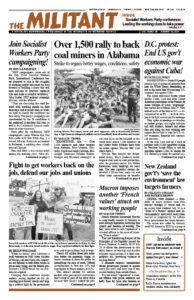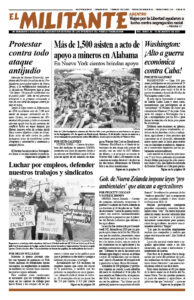The U.S. capitalist ruling families will never forgive working people in Cuba for their 1959 revolution that overthrew dictator Fulgencio Batista, who ensured superprofits for U.S. bosses and bankers.
Led by Fidel Castro and the July 26 Movement, Cuban toilers brought to power a workers and farmers government, nationalized U.S.-owned businesses under workers control, guaranteed land for small farmers, outlawed racial segregation and made the first socialist revolution in the Americas.
“The majority of Cubans support Castro,” U.S. State Department official Lester Mallory admitted in an April 6, 1960, memorandum. The solution? Deny “money and supplies to Cuba, to decrease monetary and real wages, to bring about hunger, desperation and overthrow of government.”
That’s been the policy of every U.S. president, Democrat and Republican alike, since.
Washington imposes hundreds of economic and financial restrictions. For instance, any ship that stops at a Cuban port — even for maintenance — is banned from docking at a U.S. port for six months, unless its cargo is specifically exempted from the embargo.
Banks are prohibited from handling many Cuban financial transactions. The risk of fines and U.S. retaliation are so high that many foreign banks won’t take the chance, even when Washington permits the transaction.
Any product with more than 10% U.S. components is banned from being traded to Cuba, unless specifically granted a permit. The Treasury Department claims that permits for medicines and medical devices “are generally approved.” But the Cuban government reports it can’t obtain everything from medicines to hearing aids because of the restrictions and because shipping companies refuse to transport the purchases they are able to make.
Family remittances from Cuban Americans plummeted 54% in 2020, from $3.7 billion in 2019. They dropped further after Western Union shut down its Cuba operations in November 2020, following new measures imposed by the Donald Trump administration.
Moves by Washington to prevent Cuba from receiving oil from Venezuela and other countries have led to factory shutdowns. Farmers are forced to use oxen instead of tractors and face difficulties getting their harvest to the cities. Cuba faces barriers to export trade, slashing the country’s ability to obtain hard currency. Without hard currency, Cuba can’t buy enough raw materials and spare parts to maintain production or get the food it needs.
Washington allows Cuba to buy some agricultural goods from the U.S. But unlike the rest of the world, Cuba must pay up front. No credit is allowed.
The Cuban government reports lost production and higher costs have set back the country $5.57 billion from April 2019 to March 2020 alone. This is on top of the impact of the worldwide capitalist economic crisis and the COVID-19 pandemic.
U.S. politicians and pundits across the capitalist political spectrum have jumped on the anti-Cuba bandwagon. Wall Street Journal columnist Mary Anastasia O’Grady, a vitriolic opponent of the Cuban Revolution, claimed July 25 that it is a “Marxist myth that sanctions impede Cuban development.” Democratic “socialist” Alexandria Ocasio-Cortez, who says she opposes the embargo, lays the primary blame for the difficulties facing working people on the Cuban government.
Cuban revolutionaries don’t claim that the U.S. economic war is the only reason for the challenges they have. But it is a key obstacle.
“Lift the embargo and then we’ll see how we do,” says Cuban President Miguel Díaz-Canel, “how this people will advance.”

